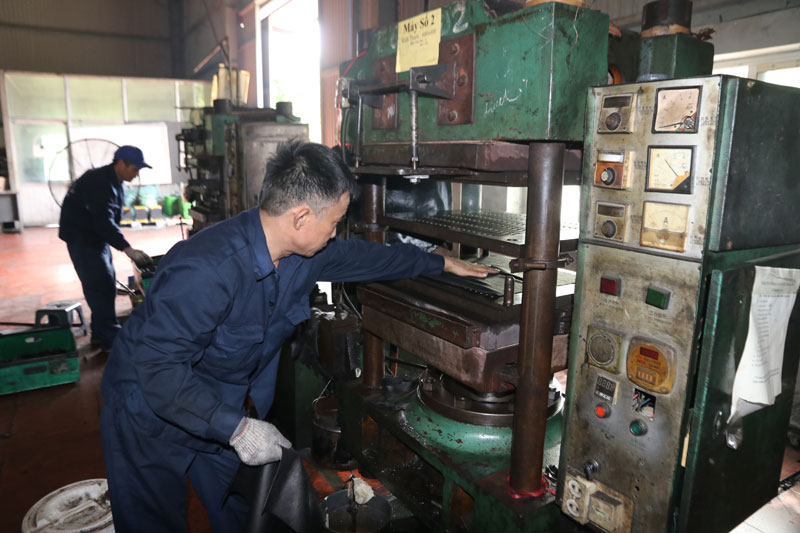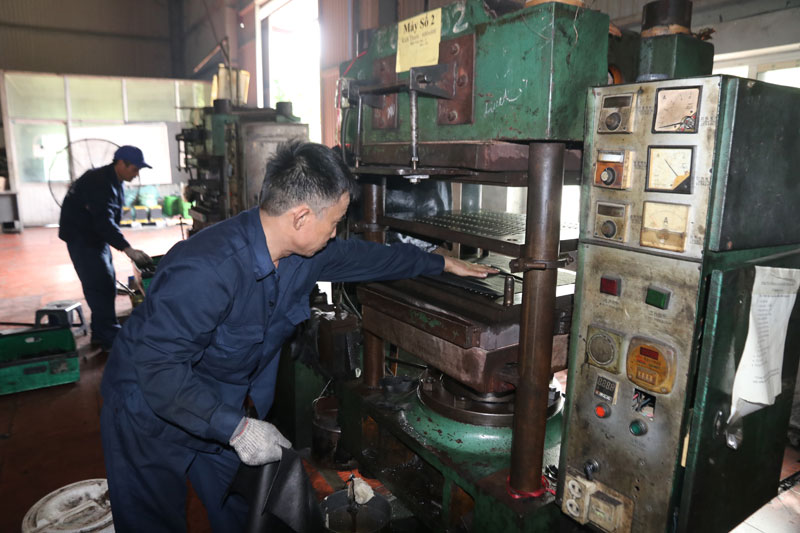
Vu Thi Hop, Chairwoman of the Da Hop JSC – investor of the Da River Left Bank Industrial Zone in Hoa Binh province, said the company did not only invest hundreds of billions of VND in developing infrastructure at the industrial park, but also strived to attract investors, particularly in environmentally-friendly and hi-tech industries that require large investment.
![]()
 Workers of Dai Mo Rubber
Plastics JSC at Luong Son Industrial Park.
Workers of Dai Mo Rubber
Plastics JSC at Luong Son Industrial Park.
Vu Thi Hop, Chairwoman of the Da Hop JSC – investor of the Da
River Left
Bank Industrial Zone in Hoa
Binh province, said the company did not only invest hundreds of billions of VND in developing infrastructure at the industrial park, but also strived to attract investors,
particularly in environmentally-friendly and hi-tech industries that require
large investment.
The industrial
park currently houses 23 enterprises, including six FDI firms. Last month, the
Da Hop JSC received representatives from Japan’s Private Finance Initiative
(PFI) to promote industrial investment not only at the Da River Left Bank Industrial
Zone, but also in other
districts of the province.
The province’s
industrial and handicraft production has seen progress since the beginning of
the year with improved business climate that continued to motivate the economic
growth. The industry, particularly processing and manufacturing, was the key
driver of the economic growth.
In the first
three quarters of the year, the province’s industrial and handicraft production
valued at 26.8 trillion VND, up 12.7 percent compared to the same period last year
and equal to 71.7 percent of the yearly target. Its Index of Industrial
Production (IIP) picked up 10.5 percent year on year with significant growth
recorded in various areas of the processing and manufacturing industry, such as
clothing, electronics, bricks, MDF boards, cement, animal feeds and steel
structures.
Many local
textile-garment and footwear producers have orders until the year end and are
working hard to fulfill these orders and look for new ones.
During the
period, accumulated electricity production exceeded 8.2 million kWh, representing72.6 percent of the yearly goal.
Positive sign was also witnessed in the mining with production of construction
stone expanding 40.1 percent year on year while that of coal increasing 22.3
percent year on year.
Hoa Binh expects
the industrial production value to reach nearly 10.6 trillion VND in the last three
months of 2019 to bring the entire year’s figure to 39.4 trillion VND, creating
impetus for the province’s economic growth in the following years./.
According to data from the Hoa Binh Provincial Party Committee, the industrial production index for the first six months of 2025 is estimated to have increased by 20% compared to the same period last year. This marks the highest year-on-year growth rate for this period since 2020.
In the first six months of 2025, Hoa Binh province’s export turnover was estimated at 1.145 billion USD, marking an 18.11% increase compared to the same period in 2024. Import turnover was estimated at $ 804 million, a 17.15% increase, which helped the province maintain a positive trade balance.
The lives of the ethnic minority farmers in Tan Lac district have gradually improved thanks to the new directions in agricultural production. This is a testament to the collective strength fostered through the professional associations and groups implemented by various levels of the district’s Farmers’ Union.
With the motto the "product quality comes first,” after nearly one year of establishment and operation, Muong village’s Clean Food Agricultural and Commercial Cooperative, located in Cau Hamlet, Hung Son Commune (Kim Boi district), has launched reputable, high-quality agricultural products to the market that are well-received by consumers. The products such as Muong village’s pork sausage, salt-cured chicken, and salt-cured pork hocks have gradually carved out a place in the market and they are on the path to obtaining the OCOP certification.
In the past, the phrase "bumper harvest, rock-bottom prices" was a familiar refrain for Vietnamese farmers engaged in fragmented, small-scale agriculture. But today, a new spirit is emerging across rural areas of Hoa Binh province - one of collaboration, organisation, and collective economic models that provide a stable foundation for production.
Maintaining growing area codes and packing facility codes in accordance with regulations is a mandatory requirement for agricultural products to be eligible for export. Recently, the Department of Agriculture and Environment of Hoa Binh province has intensified technical supervision of designated farming areas and packing facilities to safeguard the "green passport" that enables its products to access international markets.



 Workers of Dai Mo Rubber
Plastics JSC at Luong Son Industrial Park.
Workers of Dai Mo Rubber
Plastics JSC at Luong Son Industrial Park.